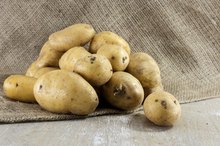Foods Least Likely to Cause Acne
Up to 45 million Americans have acne, making it the most prevalent skin condition in the U.S., according to the University of Maryland Medical Center. Symptoms can include whiteheads, blackheads, pink bumps, pimples and large, inflamed and pus-filled lesions known as cysts and nodules, which might lead to scarring. Particular foods do not cause acne. Your overall dietary lifestyle, however, might play a role in managing your symptoms. For best results, seek guidance from your dermatologist or dietitian.
Whole Grains
Whole grains, such as:
- oats
- barley
- brown rice
- quinoa
- popcorn
- contain all nutritious parts of the grain
Lowering the glycemic impact of your diet might lead to fewer acne symptoms, according to a report published by the "Skin Therapy Letter" in 2010, by improving levels of the hormone insulin 1. Hormonal imbalances are one factor that contributes to acne outbreaks. To lower the glycemic impact of your meals, replace enriched breads, pasta and rice with 100 percent whole grain equivalents. For example, air-popped popcorn provides a low-glycemic snack alternative to potato chips and pretzels.
- Whole grains, such as: * oats
* barley
* brown rice
* quinoa
* popcorn
* contain all nutritious parts of the grain Lowering the glycemic impact of your diet might lead to fewer acne symptoms, according to a report published by the "Skin Therapy Letter" in 2010, by improving levels of the hormone insulin 1.
Fruits and Vegetables
Home Remedy for an Infected Pimple
Learn More
Fruits and vegetables are top sources of antioxidants, including vitamins C and A, which support your body's ability to fend off and heal from infections and disease. Vitamin A has many properties identical to those of retinoid drugs, which are used to treat acne. Unlike medications and dietary supplements, vitamin A-rich foods aren't known to pose risks for side effects. Fruits and vegetables particularly rich in vitamin A include:
- mangoes
- apricots
- tangerines
- cantaloupe
- papaya
- spinach
- kale
- carrots
Carrot juice is an additional valuable source.
- Fruits and vegetables are top sources of antioxidants, including vitamins C and A, which support your body's ability to fend off and heal from infections and disease.
Soy Products
Soy is a protein-rich legume consumed in whole food form and as the basis of nondairy milk products, such as soy-based milk, yogurt and cheeses. Although dairy products affect people differently, they are associated with increased acne symptoms in some people. If your symptoms tend to flare up or worsen after consuming dairy products, opting for nondairy, soy-based equivalents provides a nutritious alternative. Soy products particularly rich in calcium include fortified soy milk and tofu.
- Soy is a protein-rich legume consumed in whole food form and as the basis of nondairy milk products, such as soy-based milk, yogurt and cheeses.
Cold-Water Fish and Flaxseed
Beta Carotene for Acne
Learn More
Because fish is rich in protein, and flaxseed is rich in fiber, both foods are also low-glycemic. Eat flaxseed on its own or as a nutritious addition to smoothies, yogurt, baked goods and cereals.
Related Articles
References
- "Skin Therapy Letter"; "Does Diet Really Affect Acne?"; H. R. Ferdowsian and S. Levin; 2010
- "Journal of Clinical and Aesthetic Dermatology"; "The Role of Diet in Acne and Rosacea"; Jonette E. Keri and Dena E. Rosenblatt; September 2008
- Sutaria AH, Masood S, Schlessinger J. Acne Vulgaris. [Updated 2019 Dec 13]. In: StatPearls [Internet]. Treasure Island (FL): StatPearls Publishing; 2019 Jan-. Available from: https://www.ncbi.nlm.nih.gov/books/NBK459173/
- Kraft J, Freiman A. Management of acne. CMAJ. 2011;183(7):E430-5. doi:10.1503/cmaj.090374
- Sutaria AH, Masood S, Schlessinger J. Acne Vulgaris. [Updated 2019 Dec 13]. In: StatPearls [Internet]. Treasure Island (FL): StatPearls Publishing; 2019 Jan-.
- American Academy of Dermatology. WHAT CAN CLEAR SEVERE ACNE?
- Cleveland Clinic. Rosacea (Adult Acne). Last reviewed October 10, 2019.
- American Academy of Dermatology. IS SPORTS EQUIPMENT CAUSING YOUR ACNE?
- American Academy of Dermatology. I HAVE ACNE! IS IT OKAY TO WEAR MAKEUP?
- Zaenglein AL, Pathy AL, Schlosser BJ, Alikhan A, Baldwin HE, et. al. "Guidelines of Care for the Management of Acne Vulgaris." Journal of the American Academy of Dermatology; 2016. 74(5):945-73.
Writer Bio
August McLaughlin is a certified nutritionist and health writer with more than nine years of professional experience. Her work has been featured in various magazines such as "Healthy Aging," "CitySmart," "IAmThatGirl" and "ULM." She holds specializations in eating disorders, healthy weight management and sports nutrition. She is currently completing her second cookbook and Weight Limit—a series of body image/nutrition-related PSAs.









